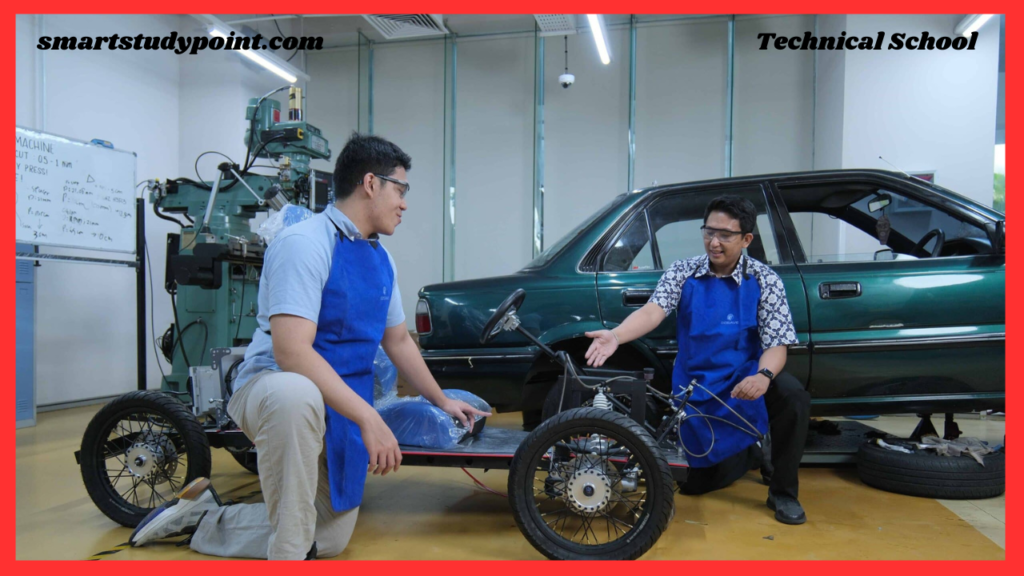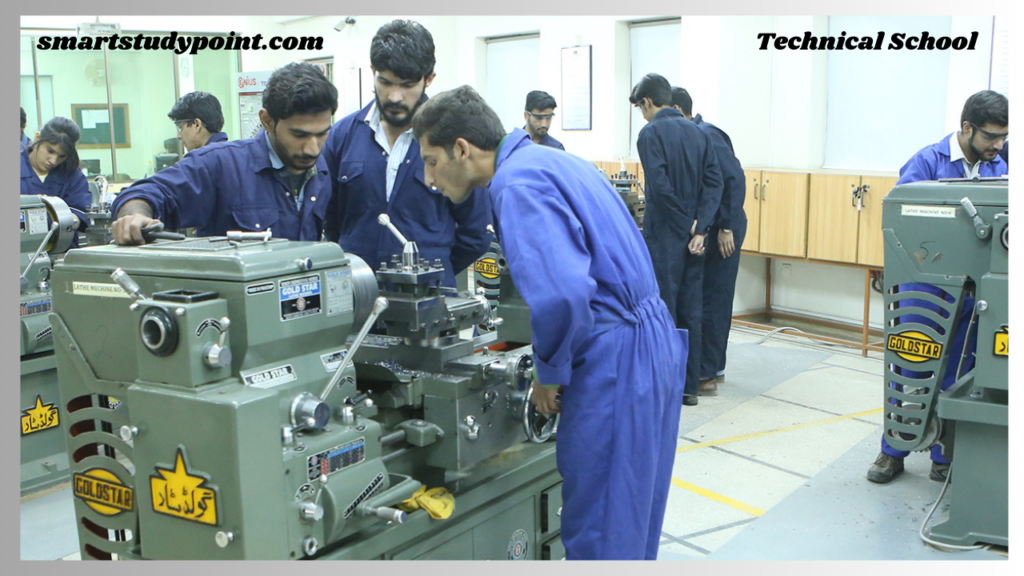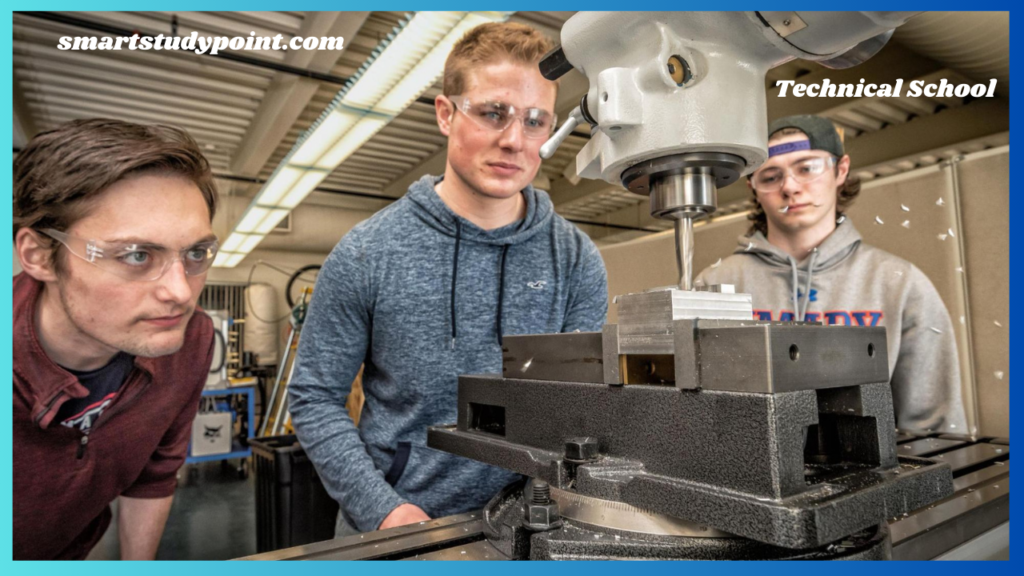According to the UN, preparing for future technological advancements requires a technical education. Several UN agencies have stated that the global development of literacy, transversal, and citizenship skills is the aim of Technical and Vocational Education and Training (TVET).

A technical degree is a qualification obtained through coursework that teaches specific education courses based on a skill set required in the workplace. This is an option that students can choose throughout their time in high school or before to pursuing a bachelor’s degree. Vocational subjects are also included in some degrees.
Students who are certain of their career path and want to begin work right away are prepared for a technical school program. It is, therefore, also a suitable option for people who wish to switch vocations or institutions.All the information you require about technical schools is covered in this page. Those of you who simply like to expand on your knowledge and learn something new might also benefit from reading this post!
What Separates Trade Schools, Vocational Training, and Technical Education?
Technical School vs Vocational School:
Trade School:
A variety of abilities unique to a particular technical vocation are taught in trade schools. Trade schools focus only on providing practical instruction for a certain career, whereas typical four-year colleges provide a wide choice of disciplines, such as a degree in Liberal Arts.
Technical School:
Technical schools, sometimes referred to as technical colleges or institutes, provide instruction aimed at preparing students for certain trades or careers. They can last anywhere from less than two to four years, depending on the curriculum you select. Graduates receive a diploma, certificate, or degree upon completion of the course. Take this qualification in digital media production, for instance.
In a tech school, you might quickly:
Can obtain a technical degree or certificate, an associate’s degree, a bachelor’s degree, or foundational degrees. discover how a particular trade is based theoretically and scientifically.
Technical School:
After obtaining an associate’s degree, students at these two-year institutions in the US are prepared to enter the workforce immediately. Educating people in cosmetology, electrical work, medical billing and coding, degrees, etc.
These schools’ curricula, at a glance:
Goal to teach the practical work behind well-paying technical occupations. provide comprehensive courses and instruction with certifications of completion.
Technical High School:
Like technical schools, technical high schools provide a curriculum tailored to prepare high school students for a particular career before they pursue higher education. In addition to other core topics, these schools teach science, math, and geography. Furthermore, they instruct on how to carry out a particular trade.
Helping high school students choose, select, and get ready for a certain professional route is usually one of the benefits. While motivating the students to concentrate more on various training programs, it supports their academic endeavors. It assists them in obtaining knowledge from many fields on the program of their choosing.

These educational institutions usually provide training programs of this kind to their senior class, and the graduates of these programs possess a high school certificate as well as knowledge and training in disciplines that make them, they were prepared to start their career immediately following high school. Distinctions between vocational training, trade schools, and technical schools
Right Path Between Technical School and Vocational School:
Numerous subjects are covered in depth in a traditional university degree. A four-year degree may require you to take courses like those in the liberal arts at private or community colleges. On the other hand, if you’re looking for something more specifically tailored to your line of work, go for a professional education program or tech school.
So, which of these two suits you the best? It is contingent upon your present professional goal. What kind of employment are you interested in? Do you have any trustworthy information? Do you want to spend time studying theory or using hands-on training materials? Desire to pursue a four-year degree? Or do you prefer to finish your degree after two years?
After Technical School:

Auto mechanics:
You might be interested in learning more about the mechanics, electronics, and other systems that go into making a car work, or you might just be curious in what an automobile technician does. Following graduation, you’ll be responsible for designing, running, and maintaining cars. You must acquire the skills necessary to identify and fix the machines. With a median yearly income of $40,710, it’s a highly sought-after position.
HVAC technology:
You could like a career in HVAC if you’re interested in technological jobs and you like interacting with people in the industry. You will learn a variety of technical skills in this course, including installation techniques, troubleshooting, sales techniques, and basic customer service. An HVAC technician would make $46,126 on average per year.
Electrical installation and maintenance:
Among the jobs in electrical technology are power system/electro-mechanical technician, commercial/industrial electrician, and construction/maintenance electrician. Manufacturers of airplanes, railroads, nuclear power facilities, etc. need this field.
Welding or plumbing:
Career options in welding are numerous. You could pursue a career in fitting, sub-arc welding, or aluminum welding. The average yearly salary for graduates with less than a year of experience is $40,318. Your pay may increase as you gain experience and depending on where you work. You might be interested in learning about the top welding schools in the United States if this is the career path you wish to take. Studying fundamental instruments, fabrication techniques, fitting and usage identification, drainage, waste and venting, and other topics is necessary for plumbing. In 2018, $53,910 was the average compensation for a plumber.
Culinary arts:
Do you adore food in its entirety? A successful and enjoyable career in culinary arts may be what you’re looking for. If you choose a career in this area, you can pick up sophisticated techniques for preparing, cooking, and serving food. An average annual salary might be $54,215.
Advantages of Pursuing a Degree from a Technical School:
Specialized programs:
These classes are designed to provide you with job-specific skills. They are more focused and less generic. They have a stronger career focus than the majority of four-year college programs. If you are certain of your career path, attending a technical school can be a wise decision.
Time/cost effectiveness:
The total cost goes down because finishing these classes takes less time. Numerous of these universities provide one- or two-year programs. For people who wish to begin working right away, this might be both intriguing and beneficial. It could take a university graduate longer to find employment.

Gain experts as mentors:
Numerous highly qualified individuals from the industry teach in technical institutions. They may provide you with any necessary practical training and keep you informed about current developments in the sector. Once you graduate and start looking for work, you can use this information.
Networking opportunities:
Technical schools employ a large number of highly qualified people from the business as instructors. They’ll be able to inform you about current developments in the sector and provide you with any necessary hands-on training. After graduating, you can use this information to your advantage when looking for work.
Work experience while you study:
These institutions’ internship programs, which are integrated into the curriculum, are among its best features. This gives you excellent networking possibilities in addition to preparing you for the actual world of work. You can investigate several businesses thanks to this as well.
Flexible hours:
Many technical schools provide flexible hours, which will be appreciated by students who are currently working and attending classes at the same time. For older students and those with many obligations, night sessions or weekend classes can be beneficial. One might not find such alternatives at a typical university.
Higher rate of admission:
Technical schools tend to have more liberal admissions policies, which increases their acceptance rate. Test results and GPA will not be as important to you as they would be at a conventional 4-year institution or university.
Smaller classroom strength:
Expect more individualized attention and instruction from your instructor because the class size is typically lower. Those who would rather have a customized educational experience may find this useful.
New England Institute of Technology is an Excellent Option:
Located in Rhode Island, the New England Institute of Technology is a non-profit technical university that offers over 50 different degree programs. Associate’s and bachelor’s degrees are among them. each created by experts in the industry.
Accredited by prestigious academic organizations, the courses are reasonably priced. They also offer support to NEIT alumni and current students. Some of the greatest multinational corporations in the nation hire their students.
Making a plan for your future career might be really difficult. Making sense of these alternatives can be challenging. With their years of experience and knowledge, NEIT, however, can assist you in making a selection. Contact them by clicking this link.
FAQS:
A general education college: what is it? Technical colleges: what are they? What distinguishes them from each other, and how?
In most cases, a college or university offers general education as a 4-year course. A standard institution allows students to pursue a wider variety of disciplines. Tech schools provide specialized courses to help students become employable as soon as possible.
How does a technical school appear?
A technical school that is an example is the New England Institute of technical. This is one of the nation’s most well-known technical vocational institutions. Programs on a range of extremely specialized occupations are taught by the institute. Submit an application to a program in a field of interest.
How does a technical school appear?
A technical school that is an example is the New England Institute of technical. This is one of the most well-known technical vocational schools in the country. The institute offers programs on a variety of incredibly specialized careers. Apply online for a course in your desired field of study.
What does Pakistani vocational and technical education entail?
Students gain job-related skills in vocational schools, often known as polytechnic or polytrade schools in Pakistan. Through hands-on instruction and curriculum tailored to certain jobs, these schools teach their pupils. Vocational schools offer professional certificates, which are a very beneficial addition to a résumé.
What is bachelor of technical vocational?
The Bachelor of Technology and Vocational Education (BTVTE) degree prepares students for teaching specific subjects in Industrial Arts, Home Economics, ICT, or Agri-Fishery, the four technical and vocational tracks in the K–12 curriculum.
How many Pakistani technical and vocational institutes exist?
Notwithstanding the fact that 1.8 million young people enter the workforce annually in Pakistan, only 433,237 students were enrolled in formal Technical and Vocational Education and Training (TVET) programs delivered by 3,740 institutes in 2018.
What is a technical subject?
A technical component of a larger field of study, like music or art, or a course focused on a practical study, such engineering, technology, design, business, or another topic connected to the workforce.
What is a technical career?
Nowadays, any career is a technical career. This is because technology has a significant impact on both our personal and professional life. It follows that learning how to use technology on a daily basis will be necessary for everyone working in the healthcare, IT, retail, or farming industries.
What is the full meaning of vocational education?
Knowledge, abilities, and competencies unique to a given trade, profession, or class of trades are imparted through education. There may be work-based components to vocational education (e.g. apprenticeships).
Why do we need technical education?
It is via this kind of instruction that innovation is stimulated. Students are encouraged to experiment, explore, and welcome change. Through the promotion of innovation, tech-ed guarantees that students are not only ready for the workforce of today, but also have the skills necessary to steer the industries of the future.
Conclusion:
Finally, technical schools in England are an essential part of the country’s educational system because they help students bridge the gap between traditional academic courses and the demands of a rapidly changing labor market. With the help of their specialized instruction and practical training, these schools provide students with the industry knowledge and real-world skills necessary to succeed in a variety of technical disciplines.
Technical colleges not only solve the skills gap but also give students great chances to grow in their careers by emphasizing real-world applications and building strong relationships with companies. Technical school will surely play an increasingly more important role in producing a workforce that is resilient and skilled as England continues to adjust to economic and technological changes.
In this article I have discussed information about the Technical School .I hope this will beneficial for you .in the case of any issue you can contact on my website link. Thanks